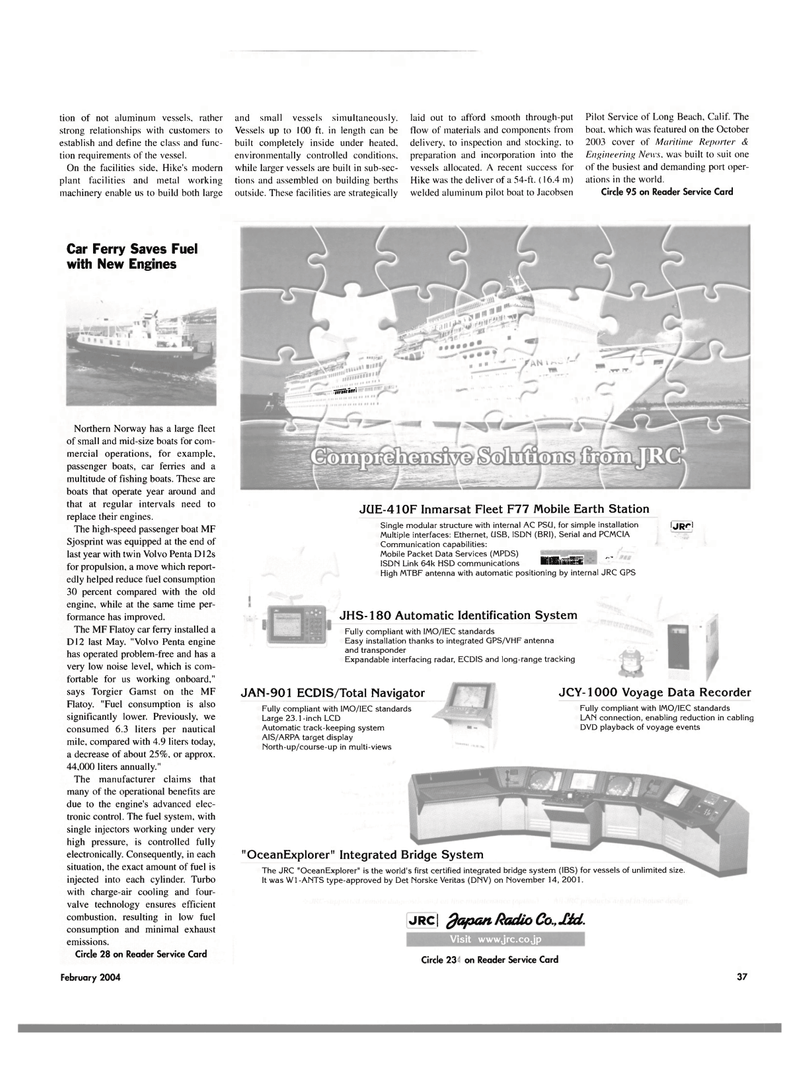
Page 42: of Maritime Reporter Magazine (February 2004)
The Tanker Yearbook: ATB Edition
Read this page in Pdf, Flash or Html5 edition of February 2004 Maritime Reporter Magazine
tion of not aluminum vessels, rather strong relationships with customers to establish and define the class and func- tion requirements of the vessel.
On the facilities side. Hike's modern plant facilities and metal working machinery enable us to build both large and small vessels simultaneously.
Vessels up to 100 ft. in length can be built completely inside under heated, environmentally controlled conditions, while larger vessels are built in sub-sec- tions and assembled on building berths outside. These facilities are strategically laid out to afford smooth through-put flow of materials and components from delivery, to inspection and stocking, to preparation and incorporation into the vessels allocated. A recent success for
Hike was the deliver of a 54-ft. (16.4 m) welded aluminum pilot boat to Jacobsen
Pilot Service of Long Beach, Calif. The boat, which was featured on the October 2003 cover of Maritime Reporter &
Engineering News, was built to suit one of the busiest and demanding port oper- ations in the world.
Circle 95 on Reader Service Card
Car Ferry Saves Fuel with New Engines
Northern Norway has a large fleet of small and mid-size boats for com- mercial operations, for example, passenger boats, car ferries and a multitude of fishing boats. These are boats that operate year around and that at regular intervals need to replace their engines.
The high-speed passenger boat MF
Sjosprint was equipped at the end of last year with twin Volvo Penta D12s for propulsion, a move which report- edly helped reduce fuel consumption 30 percent compared with the old engine, while at the same time per- formance has improved.
The MF Flatoy car ferry installed a
D12 last May. "Volvo Penta engine has operated problem-free and has a very low noise level, which is com- fortable for us working onboard," says Torgier Gamst on the MF
Flatoy. "Fuel consumption is also significantly lower. Previously, we consumed 6.3 liters per nautical mile, compared with 4.9 liters today, a decrease of about 25%, or approx. 44,000 liters annually."
The manufacturer claims that many of the operational benefits are due to the engine's advanced elec- tronic control. The fuel system, with single injectors working under very high pressure, is controlled fully electronically. Consequently, in each situation, the exact amount of fuel is injected into each cylinder. Turbo with charge-air cooling and four- valve technology ensures efficient combustion, resulting in low fuel consumption and minimal exhaust emissions.
Circle 28 on Reader Service Card
JQE-410F Inmarsat Fleet F77 Mobile Earth Station
Single modular structure with internal AC PSCI, for simple installation IJRH
Multiple interfaces: Ethernet, USB, ISDN (BRI), Serial and PCMCIA
Communication capabilities:
Mobile Packet Data Services (MPDS)
ISDN Link 64k HSD communications •M&SlSl
High MTBF antenna with automatic positioning by internal JRC GPS -- -
JHS-180 Automatic Identification System
Fully compliant with 1MO/1EC standards
Easy installation thanks to integrated GPS/VHF antenna and transponder
Expandable interfacing radar, ECDIS and long-range tracking
JAN-901 ECDIS/Total Navigator
Fully compliant with IMO/1EC standards
Large 23.1-inch LCD
Automatic track-keeping system
AIS/ARPA target display
North-up/course-up in multi-views
JCY-1000 Voyage Data Recorder
Fully compliant with IMO/IEC standards
LAN connection, enabling reduction in cabling
DVD playback of voyage events
JRCj ^apart Radio Co., JUid.
Visit www.jrc.co.jp
Circle 236 on Reader Service Card
Tfffflsiwi "OceanExplorer" Integrated Bridge System
The JRC "OceanExplorer" is the world's first certified integrated bridge system (IBS) for vessels of unlimited size.
It was Wl-ANTS type-approved by Det Norske Veritas (DNV) on November 14, 2001.
February 2004 37

 41
41

 43
43
